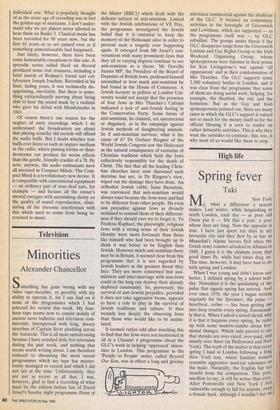Television
Minorities
Alexander Chancellor
Something has gone wrong with my video tape-recorder, or possibly with my ability to operate it, for I can find on it none of the programmes which I had selected for review this week. My four- hour tape seems now to consist mainly of ancient news bulletins and television com- mercials, interspersed with long, dreary stretches of Captain Scott plodding across the Antarctic. This is all most embarrassing because I have watched little live television during the past week, and nothing that seems worth writing about. I am therefore reduced to discussing the most recent programmes which my tape has myster- iously managed to record and which I did not see at the time. Unfortunately, they are not as recent as all that. I was, however, glad to find a recording of what must be the edition before last of David Jessel's Sunday night programme Heart of the Matter (BBC1) which dealt with the delicate subject of anti-semitism. Linked with the Jewish celebrations of VE Day, the programme investigated the Jewish belief that it is essential to keep the memory of the Holocaust alive in order to prevent such a tragedy ever happening again. It emerged from Mr Jessel's con- versations with many prominent Jews that they all in varying degrees continue to see anti-semitism as a threat. Mr Greville Janner MP, the President of the Board of Deputies of British Jews, professed himself astonished at how much anti-semitism he had found in the House of Commons. A Jewish lecturer in politics at London Uni-
versity would not accept that the presence of four Jews in Mrs Thatcher's Cabinet indicated a lack of anti-Jewish feeling in the Conservative Party. Some forms of anti-semitism, he claimed, are unconscious or disguised, as in the campaign against Jewish methods of slaughtering animals.
So if anti-semitism survives, what is the cause of it? Dr Gerhart Riegner of the World Jewish Congress saw the Holocaust as the natural consequence of centuries of Christian tradition which held the Jews collectively responsible for the death of Christ. The fact that all the leading Chris- tian churches have now disowned such doctrine has not, in Dr Riegner's view, wiped out the damage they have done. An orthodox Jewish rabbi, Isaac Bernstein, was convinced that anti-semitism would always exist because the Jews were and had to be different from other people. He even saw prejudice against Jews as divinely ordained to remind them of their different- ness if they should ever try to forget it. To Frederic Raphael, the playwright, religious Jews with a strong sense of their Jewish identity were more fortunate than those like himself who had been brought up to think it was better to be English than Jewish. However much anti-semitism there may be in Britain, it seemed clear from this programme that it is not regarded by Jewish leaders as the greatest threat they face. They are more concerned that assi- milation and inter-marriage with non-Jews could in the long run destroy their already depleted community. So, perversely, the survival of anti-Jewish prejudice, provided it does not take aggressive forms, appears to have a role to play in the survival of Jewish traditions and culture. It thus wounds less deeply the observing Jews than those who would like to be assimi- lated.
It seemed rather odd after watching this to find that the Jews were not mentioned at all in a Channel 4 programme about the GLC's work in helping 'oppressed' minor- ities in London. This programme in the
'People to People' series, called Beyond Our Ken, was in effect a long and gloomy
television commercial against the abolition of the GLC. It focused on community activities in the boroughs of Greenwich and Lewisham, which are supported — as the programme itself was — by GLC subsidies. The groups under threat if the GLC disappears range from the Greenwich Lesbian and Gay Rights Group to the Irish Weekend Organising Group, whose spokespersons were fulsome in their praise for Ken Livingstone's war against 'all oppressions' and in their condemnation of Mrs Thatcher. The GLC supports some 2,500 voluntary bodies in London, and it was clear from the programme that some of them are doing useful work, helping, for example, the disabled, the old, and the homeless. But as the Gay and Irish spokespersons pointed out, there are many cases in which the GLC's support is valued not so much for the money itself as for the official blessing it is seen to confer on rather debatable activities. This is why they want the subsidies to continue; this, too, is why most of us would like them to stop.


















































 Previous page
Previous page